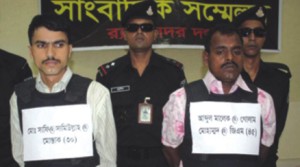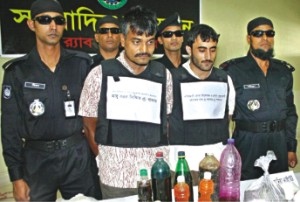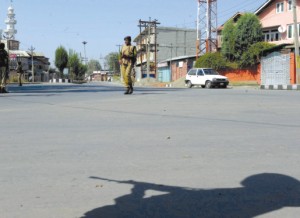|
Perspective
Their Sinister Presence
SHUDEEPTO ARIQUZZAMAN
 |
Rab is currently involved in a drive against Pakistan based peratives. |
The recent arrests of foreign nationals, allegedly members of Pakistani based militant groups Lashkar-e-Taiba (LeT), confirm something that many Bangladeshis have been suspecting for a long time: foreign militants from a certain country has been using Bangladesh as a launching pad for militant activities.
On October 4, 2010, police arrested a Pakistani national suspected to be the Chief Coordinator of the Pakistan-based banned militant outfit The LeT in Bangladesh. The Detective Branch of police (DB) arrested Pakistani national Khurram alias Mohammad Selim along with two of his associates, both Pakistanis from a hotel in Bangabandhu Avenue.
Another official, however, said on condition of anonymity that they were arrested two days ago while the announcement came today as massive raids were underway to find more Lashkar cadres. However, the exact data and time at which they were arrested cannot be confirmed.
On October 9, 2010, Rapid Action Battalion (Rab) personnel arrested two operatives of the LeT at Abdullapur in Tongi. Six bottles of bomb-making chemicals and explosives were recovered from their possession. The arrestees are Pakistani national Wazed Khan alias Zafar alias Salman, an explosive expert of the outfit, and his Bangladeshi associate Abu Bakar Siddique alias Baka. Incidentally, this is the first time a The LeT explosives expert has been arrested in Bangladesh.
In a press briefing held at the elite force's Uttara headquarters, Rab's legal and media wing Director Commander Mohammad Sohail said Wazed came to Bangladesh on April 7, 2010 and was secretly conducting the activities of the organisation.
In another drive, the Rab being informed by arrested another LeT man Maulana Mohammad Imran on September 30, and later on the Rab acting on a tip-off recovered huge explosives from a house at Shahibagh in the capital's suburb Savar on October 8, Mohammad Sohail added.
 |
Wazed Khan (right) is a LeT explosives expert. Six bottles of bomb-making chemicals and explosives were recovered from their possession. |
Law enforcers suspect that the Lashkar activists were providing money to Bangladeshi militant groups and recruiting operatives to be trained in Pakistan. Khurram was tasked to coordinate with banned outfits, such as Jamaatul Mujahideen Bangladesh (JMB) and Harkat-ul-Jihad-al Islami (Huji). The LeT, unlike local militant groups, most notably the JMB and Huji, has not yet become a household name in Bangladesh. The scenario is quite different in India and Pakistan.
In March 2010, Rapid Action Battalion (Rab) seized the Pakistani passport of Jash-e Mohammed (JeM) operative Mohammad Jawad from Shukonna Tower in the city's Science Laboratory area. Another Pakistani national Rezwan Ahmed admitted to have coordinated the JeM activities in Bangladesh. Like the LeT, the JeM is also a Pakistani based militant outfit.
"On Jawad's passport, his name and address are inscribed as Mohammad Jawad, Karachi, Pakistan. Immigration police at Shahjalal International Airport allowed him to enter Bangladesh on August 22 last year," says a top Rab official speaking to The Daily Star.
“The names of the agents of a Pakistani intelligence agency came to light from the statements of some foreign militants arrested in Bangladesh.”
In the past, operatives of Pakistan-based Lashkar-e-Taiba and India-based Asif Reza Commando Force (ARCF) have also managed Bangladeshi passports using false information. However, DB sources say that if anyone decides to enter Bangladesh using multiple passports under false names, it is not possible to detect the anomaly.
“The government has taken a bold initiative. But this initiative might shake the very pillars of the government,” says security analyst Major General (retd.) Amin Ahmed Chowdhury Bir Bikram, a former Bangladeshi ambassador. “Going against Pakistani based militant groups is risky, but it must be done in the interests of the nation.”
 |
Peace in Kashmir remains an elusive dream. |
“The terrorists wanted Bangladesh for two reasons- - destabilise the country and use Bangladesh as a transit point for inflicting wounds on India,” he says.
Bangladesh has been used in the past by Pakistani based operatives for recruiting volunteers to be trained as terrorists in Pakistan. “There are groups and individuals sympathetic to their cause and by coordinating their activities, they have penetrated very deeply into Bangladesh,” Chowdhury says. The operatives also provide weapons to different groups of insurgents in India's seven sisters. These groups lack local support and are thus heavily dependent on the help of Pakistan based operatives in Bangladesh which borders this remote and volatile Indian states.
However, these Bangladeshi agents sympathetic to the Pakistan based operatives are heavily dependent on their patrons. “Those involved with militancy in Bangladesh are dependent on their patrons,” he says. He cites the case of Shaikh Abdur Rahman and Bangla Bhai, the two leaders of JMB. “Looking at the movements of Bangla Bhai in video footages, there is enough evidence to suggest that he has never received any military training,” he says. They were totally dependent on their patrons in the government. Once they took a step too far, and their patrons removed the support, the movement collapsed. “As a result it is clear that in Bangladesh, these underground movements shall never flourish without powerful patronage.”
“Bangladesh is a very densely populated country, and militant training here is impossible without people noticing,” says Chowdhury. “Pakistan based operatives often recruit volunteers to be trained in Pakistan.”
The Let was founded with the vision of liberating Kashmir. But Chowdhury says that some Pakistani based operatives, who were in the early days committed to the Kashmir cause nowadays, only use the conflict to serve their own interests that include weapons and narcotics trafficking.
Meanwhile, in the 'Valley of Death', once known as the 'Paradise on earth', death and destruction loom large over the lives of the Kashmiri families. India has committed their fair share of atrocities in Kashmir, the form of repression that gives the Pakistan based operatives such as the LeT an agenda for militant activities. Even last month, Indian security forces have opened fire on Kashmiri independence seeking demonstrators. The civilian demonstrations have been the largest since an armed uprising against Indian rule in 1989. The recent protests were ignited on June 11, 2010 by the death of a 17-year-old student hit by a tear-gas shell during a clash with the police. Since then Indian-administered Kashmir has been paralysed by demonstrations. Curfews were imposed to stem the unrest.
Most of the victims have been killed in live firing by police and the paramilitary. It should be mentioned that the protesters were not Pakistani backed militants. Meanwhile, Amnesty International, a London-based rights group has appealed to Indian authorities to order security forces not to use live firearms against demonstrators.
However, that is no excuse for Pakistan based operatives to carry out their criminal activities in Bangladesh. As mentioned earlier, these operatives have little interest for the liberation of Kashmir. These arrests of Pakistani based operatives is disturbing as it confirms presence of international terrorist groups particularly the ones operating in South Asia on the soil of Bangladesh. Although the agencies have not been able to definitively assert the existence of LeT cells in Bangladesh, according to concerned experts, there is a constant effort to recruit Bangladeshis into these groups.
Copyright
(R) thedailystar.net 2010 |
